Happy Monday, readers! This is Sy.
The common cold is so engrained into everyday life that it’s easy to forget just how, well, “common” it really is. American adults suffer an average of two to three colds per year and children catch even more, according to the Centers for Disease Control (CDC).
There are plenty of medications out there to treat annoying cold symptoms—but killing the viruses that cause it in the first place is a trickier feat. But researchers may have identified a compound that can stop some of the most common cold viruses, the rhinovirus, in its tracks, according to a new report published in the journal Nature.
To be clear: The scientists’ work is early-stage. But the mechanism it uses to tackle colds is striking. Developed at the Imperial College London, the molecule targets a protein in human cells that cold viruses use in order to replicate and conquer. By targeting this specific pathway, the compound could theoretically be used to thwart most viruses (and since it focuses on human proteins, it may not cause the virus to mutate its way away from danger).
An effective common cold cure would be significant not just as a mass market health need, but in treating more vulnerable people.
“The common cold is an inconvenience for most of us, but can cause serious complications in people with conditions like asthma and [chronic lung disease],” said lead researcher Ed Tate in a statement. “A drug like this could be extremely beneficial if given early in infection, and we are working on making a version that could be inhaled, so that it gets to the lungs quickly.”
But first things first: Proving that the current petri dish tech can be safe and effective in humans.
Read on for the day’s news.
| Sy Mukherjee | |
| @the_sy_guy | |
| sayak.mukherjee@fortune.com |
DIGITAL HEALTH
Clover Health gets into the in-home genomic testing biz. Senior-focused health care startup Clover is getting into the genetic testing business—for free. The company is integrating genomic tests into its in-home primary care program at no cost (and on a voluntary basis). The goal? Better personalizing drug regimens for medically needy and vulnerable patients. (Healthcare Dive)
INDICATIONS
Medicare and drug price negotiations. Health and Human Services (HHS) Secretary Alex Azar on Monday answered a few more questions about the drug pricing proposal President Trump unveiled last Friday (you can read my initial writeup of Trump's speech and the gigantic ensuing yawn by health stock investors here). Azar did make some remarks that might startle the drug industry—including by pushing back on the oft-repeated big pharma talking point that lower prices automatically equates to less medical innovation. But he also argued strongly against the possibility that direct Medicare drug price negotiations would lower costs, arguing the only avenue for such a program to work would lead to undesirable care rationing. Still, drug makers will not be pleased with the administration's plan to look into more negotiating power for pricey drugs under Medicare Part B, which are treatments that are administered by health care providers in a hospital setting. (Reuters)
THE BIG PICTURE
WHO throws down the gauntlet on trans fat. The World Health Organization (WHO) is ringing the death knell for trans fats across to the globe with an ambitious new plan dubbed REPLACE. WHO Director-General Dr. Tedros Adhanom Ghebreyesus wants governments worldwide to ban trans fats by 2023 (a move that the U.S. FDA made after decades of lobbying battles between public health experts and big food makers). (Fortune)
REQUIRED READING
Elon Musk Is Restructuring Management at Tesla, by Kirsten Korosec
How Smart Watches May Finally Become As Useful as Traditional Watches, by Aaron Pressman
Hangover Pill Shows Promise in Lab Tests, by Chris Morris
The World's First Trade Finance Transaction on the Blockchain Involves Soybeans, by Polina Marinova
| Produced by Sy Mukherjee | |
| @the_sy_guy | |
| sayak.mukherjee@fortune.com |
Find past coverage. Sign up for other Fortune newsletters.










